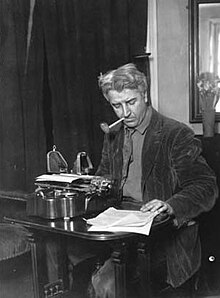George Cram Cook
George Cram Cook | |
|---|---|
 | |
| Born | George Cram Cook October 7, 1873 Davenport, Iowa, United States |
| Died | January 14, 1924 (aged 50) |
| Other names | Jig Cook |
| Alma mater | Harvard |
| Occupation | Theatre Producer |
| Known for | Provincetown Players |
| Spouse(s) | Sara H Swain Molly Price Susan Glaspell |
| Children | Nilla Cram Cook Harl Cook |
| Signature | |
George Cram Cook or Jig Cook (October 7, 1873 – January 14, 1924) was an American theatre producer, director, playwright, novelist, and poet. Cook led the founding of the Provincetown Players,[1] the first modern American theatre company.[2] During his seven-year tenure with the group Cook oversaw the production of nearly one-hundred new plays by fifty American playwrights,[3] including the first plays of Eugene O'Neill, Cook's wife Susan Glaspell, and several other noted writers.
Biography
Cook was born and raised in Davenport, Iowa, where his family was one of the town's oldest and most wealthy. His father, a corporate lawyer, strongly encouraged his education from a young age, while his mother instilled in him a passion for culture and the arts. Cook completed his bachelor's degree at Harvard in 1893. He continued his studies at the University of Heidelberg in 1894 and at the University of Geneva the following year.
Upon completing his education Cook taught English literature at the University of Iowa from 1895 until 1899, where he would lay some of the foundation for what would eventually become the famed Iowa Writers Workshop. He was also an English professor at Stanford University during the 1902 academic year.

In Davenport Cook associated with other young writers to form what was informally called the Davenport group. With his wife, dramatist Susan Glaspell, Cook left Davenport and established the Provincetown Players in 1915, an important step in the development of American theatre. The group would perform works by Cook and Glaspell as well as the first plays of Eugene O'Neill and Edna St. Vincent Millay, among others. Cook would lead the Provincetown Players until 1919, at which time he took a sabbatical. Although he returned to the group in 1920, internal wrangling and his own frustration led to his effectively abandoning the cooperative to move with his wife to Greece in 1922.
Cook and Glaspell lived at Delphi. After a short time Cook began to dress in the traditional Greek shepherd's attire. He and Glaspell spent the entire summers camped in Spruce huts high up on the mountains above the town. In 1924 Cook contracted a rare infectious disease from his pet dog and died. He is buried at Delphi.[4] So beloved was Cook by the locals that the government at Athens allowed a stone from the nearby Temple of Apollo to be used as his grave marker.
Partial bibliography
Plays
- (1915) Change Your Style.
- (1917) Suppressed Desires; co-written with Susan Glaspell.
- (1921) The Spring.
- (1925) Tickless Time; co-written with Susan Glaspell.
- (1926) The Athenian Women.
Novels
- (1903) Roderick Taliaferro: A Story of Maximilian's Empire.
- (1911) The Chasm.
Poetry
- (1925) Greek Coins; published posthumously with essays by Floyd Dell, Edna Kenton, and Susan Glaspell.
Non-fiction
- (1899) Company B of Davenport.
Further reading
- Glaspell, Susan. The Road to the Temple. New York: Frederick A. Stokes and Company, 1927. (A posthumous biography of Cook.)
- Ben-Zvi, Linda (2005). Susan Glaspell: Her Life and Times. Oxford University Press.
- Sarlos, Robert K. Jig Cook and the Provincetown Players: Theatre in Ferment. University of Massachusetts Press (1982).
- Kenton, Edna. The Provincetown Players and the Playwrights' Theatre, 1915-1922. McFarland & Company (2004).
References
- ^ Ben-Zvi, Linda. "Preface." Preface. Susan Glaspell: Her Life and Times. Oxford University Press, 2005. Ix.
- ^ Sarlós, Robert K. (1984). "The Provincetown Players' Genesis or Non-Commercial Theatre on Commercial Streets", Journal of American Culture, Vol. 7, Issue 3 (Fall 1984), pp. 65–70
- ^ http://www.provincetownplayhouse.com/history.html
- ^ Sarlós, Robert K. Jig Cook and the Provincetown Players: Theatre in Ferment. 1982: University of Massachusetts Press.
{{cite book}}: CS1 maint: location (link)
External links
- Encyclopædia Britannica: George Cram Cook
- Spartacus Educational's biography of George Cram Cook
- The Amateur: George Cram Cook (a chapter from Contour in Time: The Plays of Eugene O'Neill)
- George Cram Cook and the Poetry of Living
- “Going Native”: The Unusual Case of George Cram Cook
- Famous Iowans: George Cram Cook (Des Moines Register)
- George Cram Cook biographical essay at Davenport Public Library
- Cook's 1923 passport photo
- George Cram Cook at the Findagrave.com database (includes photo of Cook's grave with the temple-piece headstone)
- History of the Provincetown Playhouse
- 1873 births
- 1924 deaths
- Writers from Davenport, Iowa
- American male writers
- 20th-century American dramatists and playwrights
- 20th-century American novelists
- Modernist theatre
- Harvard University alumni
- Heidelberg University alumni
- Stanford University Department of English faculty
- Infectious disease deaths in Greece
- American male novelists
- American male dramatists and playwrights
